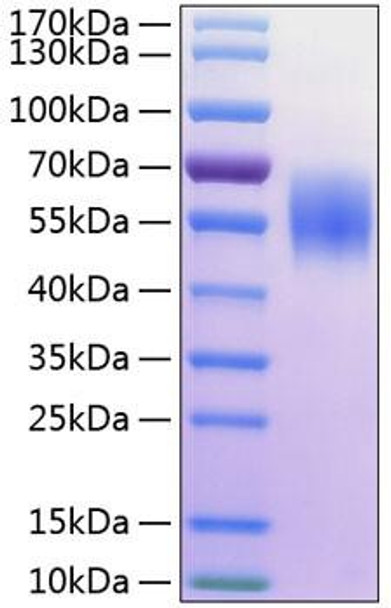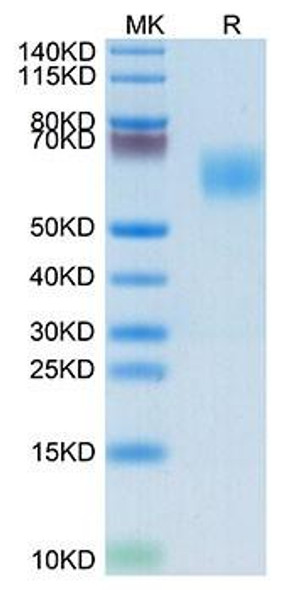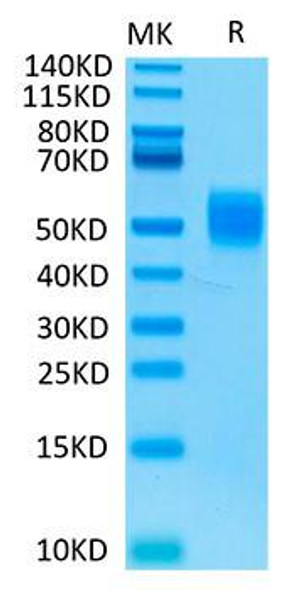Description
Recombinant Human MHC class I polypeptide-related sequence A/MIC-A Protein
The Recombinant Human MHC class I polypeptide-related sequence A/MIC-A Protein is a biologically active recombinant protein that plays a significant role in various cellular processes and signaling pathways in human biology. This protein is widely employed in immunological research, cell biology studies, protein-protein interaction analyses, and therapeutic development, providing researchers with a reliable tool for investigating MHC class I polypeptide-related sequence A/MIC-A function and its implications in health and disease.
This product (SKU: RPCB0286) is produced using HEK293 cells and features a C-His tag for convenient detection and purification. The protein exhibits a calculated molecular weight of 35.88 kDa with an observed molecular weight of 50-70 kDa under denaturing conditions, achieving ≥ 95 % as determined by SDS-PAGE.. Functional bioactivity has been validated through rigorous quality control assays, confirming its suitability for demanding research applications.
Key Features
| High Purity by Affinity Chromatography | |
| Mammalian & Bacterial Expression Systems | |
| High lot-to-lot consistency via strict QC |
| Product Name: | Recombinant Human MHC class I polypeptide-related sequence A/MIC-A Protein |
| SKU: | RPCB0286 |
| Size: | 10 μg , 20 μg , 50 μg , 100 μg |
| Reactivity: | Human |
| Synonyms: | MICA, MIC-A, PERB11.1, MHC class I polypeptide-related sequence A, MIC-A, PERB11.1 |
| Tag: | C-His |
| Expression Host: | HEK293 cells |
| Calculated MW: | 35.88 kDa |
| Observed MW: | 50-70 kDa |
| Gene ID: | 100507436 |
| Protein Description: | High quality, high purity and low endotoxin recombinant Recombinant Human MHC class I polypeptide-related sequence A/MIC-A Protein (RPCB0286), tested reactivity in HEK293 cells and has been validated in SDS-PAGE.100% guaranteed. |
| Endotoxin: | < 0.1 EU/μg of the protein by LAL method. |
| Purity: | ≥ 95 % as determined by SDS-PAGE. |
| Formulation: | Lyophilized from a 0.22 μm filtered solution of PBS, pH 7.4.Contact us for customized product form or formulation. |
| Bio-Activity: | Measured by its binding ability in a functional ELISA. Immobilized Human MICA Protein at 2 μg/mL (100 μL/well) can bind NKG2D with a linear range of 0.61-14.3 ng/mL. |
| Reconstitution: | Centrifuge the vial before opening. Reconstitute to a concentration of 0.1-0.5 mg/mL in sterile distilled water. Avoid vortex or vigorously pipetting the protein. For long term storage, it is recommended to add a carrier protein or stablizer (e.g. 0.1% BSA, 5% HSA, 10% FBS or 5% Trehalose), and aliquot the reconstituted protein solution to minimize free-thaw cycles. |
| Storage: | Store at -20℃.Store the lyophilized protein at -20℃ to -80 ℃ up to 1 year from the date of receipt. After reconstitution, the protein solution is stable at -20℃ for 3 months, at 2-8℃ for up to 1 week. |
MHC class I chain-related molecules A (MICA) is one of the genes in the HLA class I region, which belongs to MHC class I family. It is the member of the non-classical class I family that displays the greatest degree of polymorphism. The MICA protein product is expressed on the cell surface, although unlike canonical class I molecules it does not seem to associate with beta-2-microglobulin. It is a ligand for the NKG2-D type II integral membrane protein receptor. The protein functions as a stress-induced antigen that is broadly recognized by intestinal epithelial gamma delta T cells. Variations in this gene have been associated with susceptibility to psoriasis 1 and psoriatic arthritis, and the shedding of MICA-related antibodies and ligands is involved in the progression from monoclonal gammopathy of undetermined significance to multiple myeloma.








